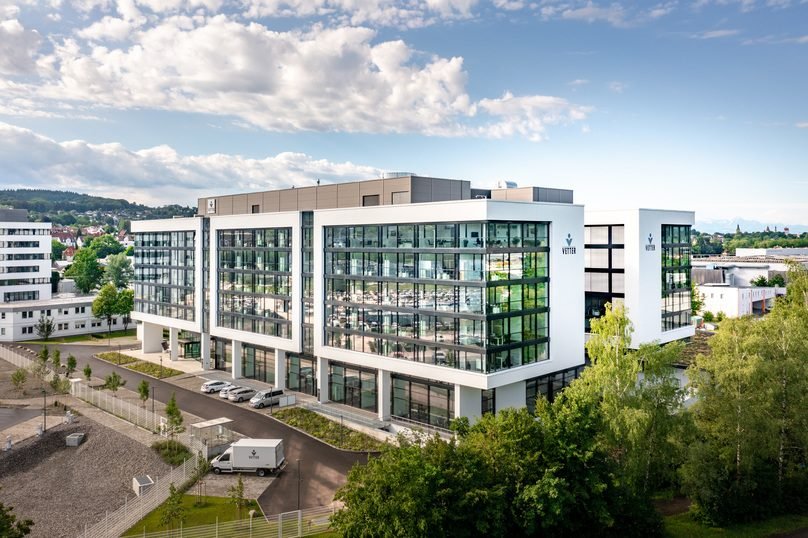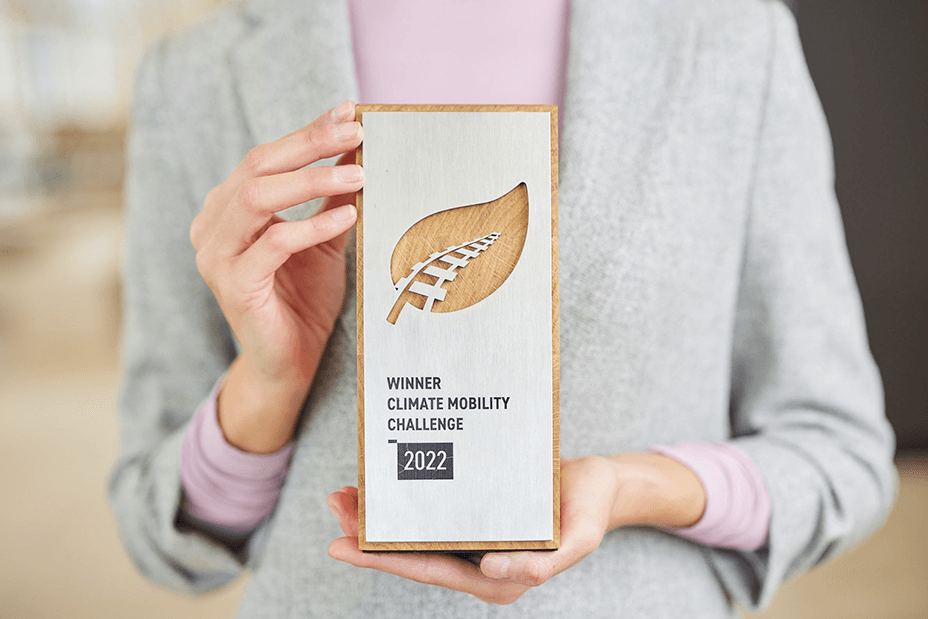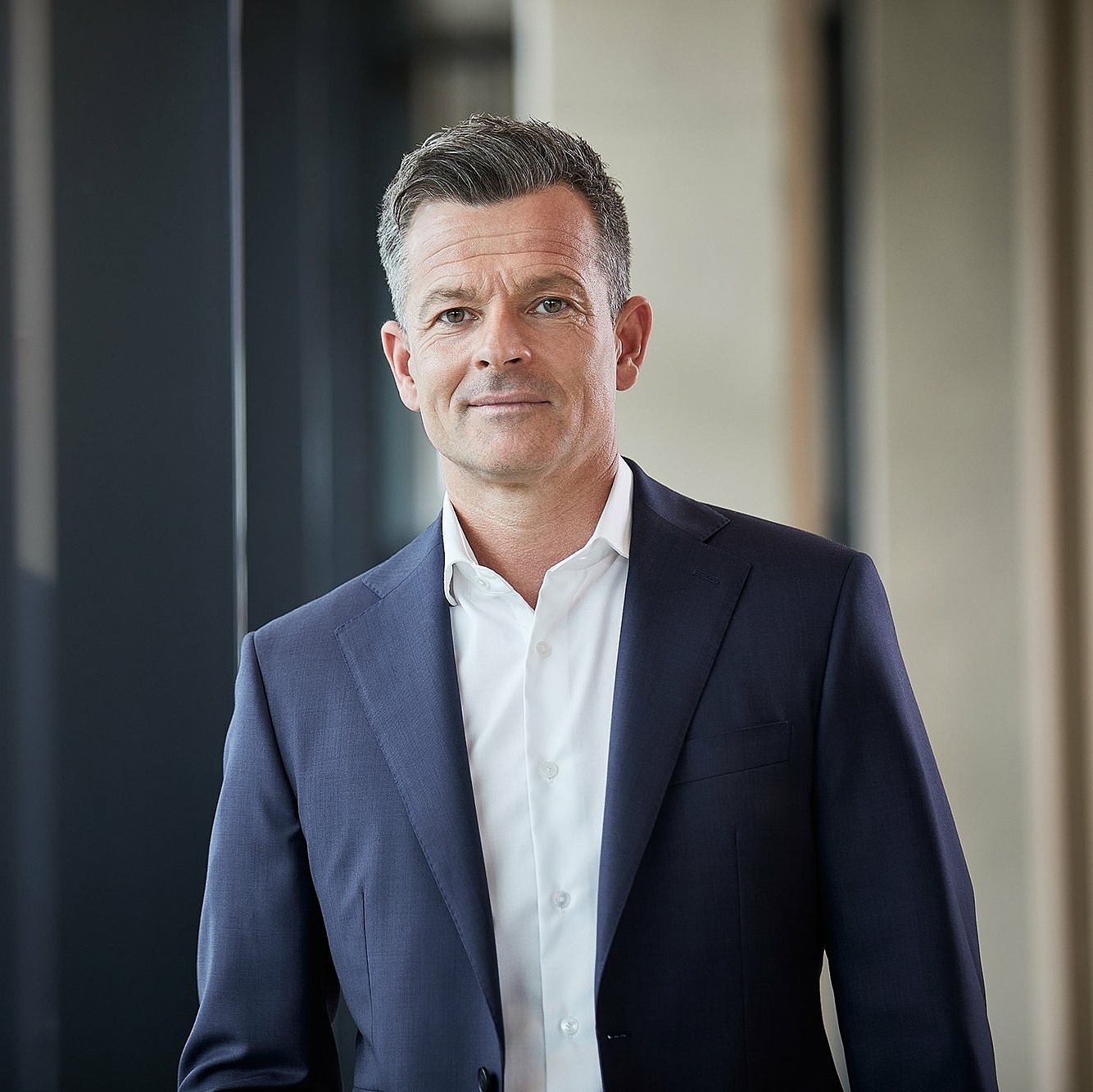
The topic of mobility is a strong part of our holistic sustainability strategy. In 2018, a wide-ranging sustainability offensive was launched with an extensive mobility survey among all employees. The current situation was analyzed and any possible potential for alternative mobility was identified and represents the cornerstone for the upcoming change.
Using these figures as a basis, we then defined three strategic goals to reduce the environmental impact of commuting and internal transportation. By 2029, we want to have doubled:
- Bicycle usage
- Carpools
- Public transportation
Other measures include parking spaces with quick charging stations for e-cars and the possibility of expansion to another 25 stations.
After the outbreak of the corona pandemic, we quickly switched to mobile working wherever possible. What arose out of necessity we maintain today in order to keep commuter numbers lower in the long term. In this way, we can continue to calculate future emissions saved through avoided mobility and include them in the company's CO2 balance sheet.
The project team continues to work with the company’s health management to further advance alternative and attractive mobility modules. Together with the Mobility Management Network, which we initiated, and with private and public decision-makers, as a team, we are constantly developing further possibilities for more sustainable mobility in the Ravensburg region.

Because this topic is very close to our hearts, the Climate Mobility Challenge trophy has also been given a place of honor in a display case in our entrance area, along with a wide range of other industry prizes and awards already on display such as the Social Impact Award on Employees. Visitors can also look at the Diversity Charter which Vetter signed years ago to promote equal opportunities for all people in the company.
Sustainable employee mobility: desire and obligation
Of course, climate change and the associated clean air plan of the city of Ravensburg had a major influence on our decision to make employee mobility sustainable. In this context, commuter mobility was identified as a key environmental aspect because of the many emissions involved. As the largest employer in the city of Ravensburg with a share of more than 10 percent of daily commuters, we most certainly wanted to contribute and help make an improvement. In addition, because the company continues to grow strongly, we needed a greater number of parking spaces. The voices from the workforce for sustainable employee mobility were also getting louder.
Sustainability at Vetter
From concept to implementation
After initial discussions with the city of Ravensburg and a free consultation with the nationwide ‘Mobil gewinnt’ (transl. mobility wins) initiative, the decision was made: We want to build a holistic mobility concept based on a mobility survey of all employees. It took about 12 months to get there.
Hurdles and challenges
Any time a mobility concept is to be created from scratch, the big challenge for every company is the same: Finding out what fits the needs of the employee, the company and the infrastructure conditions. Doing justice to all can only be achieved with a holistic approach.
The company cannot dictate to its employees which means of transport they should use to safely get to work. Our task is to make the individual components of the sustainability and mobility concept so attractive that employees actively support our mobility transition. That is why we constantly inform people about the wide range of options available so that everyone can find a suitable, more sustainable way to get to work.

Our task is to make the individual components of the mobility concept so attractive that employees actively support our mobility transition.
Henryk Badack, Senior Vice President Technical Service / Internal Project Management
As a company, we have to strike a balance between economy and ecology, which is not always easy. A holistic mobility concept requires a high level of commitment as well as investment and will only succeed if we do not lose sight of the goal of the mobility turnaround.
Some examples of modules of the mobility concept are:
For years, we have been working to expand and consolidate public transport connections to our production sites.
We are investing in extensive bicycle infrastructure and have created good and comfortable bicycle parking spaces, some with e-charging stations for e-bikes so that our employees can increasingly come to the company by bicycle. Long-distance cyclists will find shower facilities and changing rooms. As such, we also included and thought through follow-up projects with additional investments at an early stage.
We support and subsidize public transport tickets to make bus and train travel more attractive.
And this is what the workforce is saying
"I regularly come to work by train and folding bike. It's important to me to make a contribution to environmental protection and resource conservation. Change doesn't happen on its own, but only if we all join in. In addition to the environmental aspect, the costs also play a role for me. The 50% subsidy for monthly tickets is therefore a great thing." Michael L. on the public transport subsidy
"I switched from the car to public transportation and really appreciate the time gained, which would otherwise "fall by the wayside". Since we can work regularly in the office again, it makes sense for me to take the train from Laupheim to work in Ravensburg. It's just a few steps on foot from the train station to the site." Sarah Z. on the taster campaign ÖPNV tickets
"Since I started working at Vetter, I've been taking the train and my bike to work from Aulendorf. I think it's great what Vetter is doing and I wish, not only for the sake of the environment, that more colleagues from the shift would take advantage of this great offer. It's also good for your health to come to work by bike instead of by car”. Jürgen F. on regular public transport use
And where is the fun in that?
We do a lot to motivate our workforce on the topic in a playful way. For example, we take part in initiatives such as "green ways to work" or "Stadtradeln" (transl. city cycling). Here, colleagues can compete as a team with other cycling teams in the municipality. We were also able to recruit professional cyclist Daniel Gathof as an ‘ambassador’ for cycling on behalf of Vetter. Among other things, he offers employees mountain bike tours or driver safety training at regular intervals. These activities encourage a change in mobility behavior over the long term.
Interdisciplinary work with a view to the big picture
The EHS (Environment, Health & Safety) team is responsible for sustainable mobility. This is also where the sustainability strategy as a whole is located. The team designs, implements, monitors and develops everything to do with climate protection, resource conservation and the environment. We also work with Human Resources, Financial Accounting, Plant and Site Development, and the Works Council. This interdisciplinarity is very important for a holistic view of the measures.
With strong cooperation to the mobility turnaround
With regard to rental bikes, we are in cooperation with the Ravensburg public utility company which operates a rental bike network with the TWS bikes in the Ravensburg-Weingarten urban area. We have also been in direct exchange with the city and the regional public transport provider bodo (Bodensee-Oberschwaben-Verkehrsverbund) from the very beginning. And, through the JobRad initiative, our employees can lease bicycles at attractive conditions.
Creating the mobility turnaround with Vetter
And so it continues
The cornerstone has been laid - now we will steadily expand and modernize: Covered, comfortable bicycle parking spaces with charging facilities and a repair station will be successively expanded. In addition, further stations for rental bikes are being planned.
We are in talks with the city regarding the expansion of public transport. For example, we are currently examining whether the bus times at our Ravensburg South and Ravensburg West locations can be better adapted to shift times.
Next year, a repeat of the mobility survey is planned and will tell us what we have done well in the last five years and where we can improve. We are also developing a monitoring system to track how the individual components of the mobility strategy are used and developed over the years.
Big goals lead to big change
Our long-term strategic goal is to double the share of bicyclists, public transit users, and carpoolers by 2029 compared to the 2018 baseline.
We also set out to:
- Improve public transport connections for shift employees at the Vetter sites in Ravensburg South and Ravensburg West
- Implement the carpooling app
- Implement the bicycle infrastructure of the Ravensburg South and Schützenstrasse locations identically at other locations.
In addition, a bachelor student is currently analyzing how we can better reach employees on sustainability issues in general and, specifically, with regard to a change in mobility behavior.
Together for the mobility turnaround - also in the region
Neighboring companies approach us to get ideas. That is why we initiated the Bodensee-Oberschwaben mobility network - to actively exchange ideas with other regionally based companies, share experiences, and move further ahead together.
That is the reason for the Climate Mobility Challenge
We became aware of the competition through a newsletter. By taking part we can think outside the box and have an external party check where we stand with our concept. We were curious about the result but had not expected this super result.
We put the mobility prizes into a lottery pot on the occasion of the Stadtradeln 2022 campaign and motivated our employees to cycle along with these attractive prizes. The main prize was four weekends with two nights each in a Motel One of your choice and a rail voucher worth €500.
This award is a snapshot and confirmation that we are already doing many things well and are on the right track. We are taking on a kind of role model here which motivates us to think ahead and identify any potential that will make mobility more sustainable and thus have a positive impact on the climate.
Input for this article is provided by Henryk Badack, Senior Vice President Technical Service / Internal Project Management at Vetter:
Henryk Badack holds the position of Senior Vice President Technical Service and Internal Project Management at Vetter. In this role, he is responsible for the company's internal, technical and infrastructure projects as well as for the Environmental Health & Safety and Vetter Optimization Systems departments.
He has 20 years of experience in the pharmaceutical industry and joined Vetter in 2003 as project manager for validation and qualification projects. In 2007/2008, he held positions of increasing responsibility at Sandoz before returning to Vetter in 2009.
The article was originally published on challenge.bahnbusiness.de (german)

